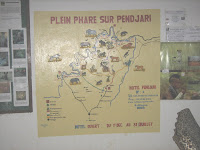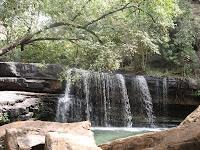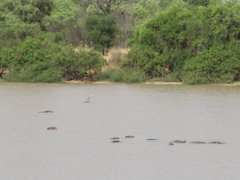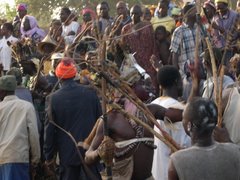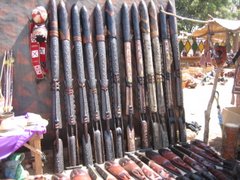.JPG) afterwards it is hard to imagine your life without it. African cuisine is exactly one of those things. There is a reason you don’t see African restaurants next to Chinese, Indian or Mexican restaurants. At first, African cuisine seems very dull and flavorless with not to much to it. The favorite dish is Pate (pot) which combines corn flour and hot water to form a flavorless gelatin like mound that is served with different types of sauces. Next to that is
afterwards it is hard to imagine your life without it. African cuisine is exactly one of those things. There is a reason you don’t see African restaurants next to Chinese, Indian or Mexican restaurants. At first, African cuisine seems very dull and flavorless with not to much to it. The favorite dish is Pate (pot) which combines corn flour and hot water to form a flavorless gelatin like mound that is served with different types of sauces. Next to that is.JPG) Akasa, which is fermented Pate with a bitter taste, here in the north of Benin and throughout West Africa the favorite dish is igyam pille or pounded yams, something like the texture and look of mashed potatoes, that is combined with sauces in order to give it a flavor. For snacks you can find fried greasy balls of dough just about in any corner. For meats the favorite is mouton, a sheep like animal that can be seen roaming just about anywhere scavenging for scraps, then there is pintard or guinea fowl, a weird looking relative of chickens that I have never seen till I was in Benin. Have I won you over yet? Probably not, but give it time.
Akasa, which is fermented Pate with a bitter taste, here in the north of Benin and throughout West Africa the favorite dish is igyam pille or pounded yams, something like the texture and look of mashed potatoes, that is combined with sauces in order to give it a flavor. For snacks you can find fried greasy balls of dough just about in any corner. For meats the favorite is mouton, a sheep like animal that can be seen roaming just about anywhere scavenging for scraps, then there is pintard or guinea fowl, a weird looking relative of chickens that I have never seen till I was in Benin. Have I won you over yet? Probably not, but give it time. 
At first these things are hard to get used to, but you start to develop a taste for these things. For example, I now find pintard meat (guinea fowl) be better than chicken meat, given the option
 between the two, I would take the pintard meat over the chicken. The flavorless igyam pille has now become my favorite dish; there are weeks that all I want to eat is igyam pille morning and afternoon. It is all about the sauce, the sauces here are AMAZING; using simple ingredients like tomatoes, onions, piment (peppers), local spices and greens, women prepare the ingredients in a large pot and they slowly simmer the sauces in charcoal fire for hours, then they add cooked meat or cheese. The cheese here deserves a whole article to itself; the cheese is made by semi-
between the two, I would take the pintard meat over the chicken. The flavorless igyam pille has now become my favorite dish; there are weeks that all I want to eat is igyam pille morning and afternoon. It is all about the sauce, the sauces here are AMAZING; using simple ingredients like tomatoes, onions, piment (peppers), local spices and greens, women prepare the ingredients in a large pot and they slowly simmer the sauces in charcoal fire for hours, then they add cooked meat or cheese. The cheese here deserves a whole article to itself; the cheese is made by semi- nomadic cow herders that travel throughout West Africa. Their faces are heavy with scars or tattoos, they have similar thin, long facial features, they are tall and skinny, and they don’t really socialize with anybody outside their group, to say the least they are very mysterious. But they make the best damn cheese I ever had anywhere in the world. Known as wagasi, these strange red circular mounds that can
nomadic cow herders that travel throughout West Africa. Their faces are heavy with scars or tattoos, they have similar thin, long facial features, they are tall and skinny, and they don’t really socialize with anybody outside their group, to say the least they are very mysterious. But they make the best damn cheese I ever had anywhere in the world. Known as wagasi, these strange red circular mounds that can  be found on the side of the road infested with flies or on top of a woman’s head who walks around town selling cheese. There are so many ways to prepare the cheese and after placing it in a simmering sauce for an hour it is to lick your fingers for, literally. For a quick fix, rice and beans are staple foods that can be found just about in every corner, but taste and the way they are prepare greatly varies and of course every plate comes with a fiery red sauce. Fruit is seasonal, so when it is mango season the streets are littered with people selling huge, sweet, delicious mangoes, there are also papayas, oranges, melons and pineapples.
be found on the side of the road infested with flies or on top of a woman’s head who walks around town selling cheese. There are so many ways to prepare the cheese and after placing it in a simmering sauce for an hour it is to lick your fingers for, literally. For a quick fix, rice and beans are staple foods that can be found just about in every corner, but taste and the way they are prepare greatly varies and of course every plate comes with a fiery red sauce. Fruit is seasonal, so when it is mango season the streets are littered with people selling huge, sweet, delicious mangoes, there are also papayas, oranges, melons and pineapples.
When I first got to Africa I thought I was going to loose weight being out in sun, riding my bike throughout town. Yea right, I have actually gained weight, do you know what some people started calling me? Le gros, the fat one.


































 The best way I can explain voodoo is to compare it to the Native American religious believes, that the world is alive, that spirits are all around us, our dead ancestors are not dead but they are among us in different forms. Those spirits can protect us, bring good fortune and prosperity or the spirits can be vengeful and bring bad luck and hardship. We can contact the spirits through certain actions and rituals and there are certain people who have been given the gift of talking to spirits. These people will go into a trance and communicate with the spirits. There is a national holiday in January that celebrates voodoo and people gather in Ouida, the cradle of voodoo, where people dance in a trance and slash themselves with knives and brake bottles on their heads to prove that their body is in this world but their spirits are in another world.
The best way I can explain voodoo is to compare it to the Native American religious believes, that the world is alive, that spirits are all around us, our dead ancestors are not dead but they are among us in different forms. Those spirits can protect us, bring good fortune and prosperity or the spirits can be vengeful and bring bad luck and hardship. We can contact the spirits through certain actions and rituals and there are certain people who have been given the gift of talking to spirits. These people will go into a trance and communicate with the spirits. There is a national holiday in January that celebrates voodoo and people gather in Ouida, the cradle of voodoo, where people dance in a trance and slash themselves with knives and brake bottles on their heads to prove that their body is in this world but their spirits are in another world..jpg) Voodoo in Benin is known as
Voodoo in Benin is known as 

 check. When we were in Ghana and Togo I went all out and made sure I had a great time but as a consequence after our trip, I was broke and running on fumes.
check. When we were in Ghana and Togo I went all out and made sure I had a great time but as a consequence after our trip, I was broke and running on fumes.
